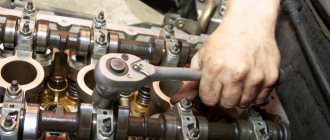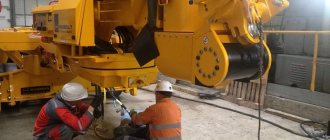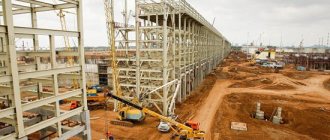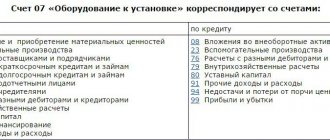Pressing is an important technological technique that is widely used in industry. The production of parts using molds is used in the aviation industry, construction, and the production of railway and automotive equipment. In this case, the material for creating products can be anything: aluminum, steel, pressed cardboard, plastic, foam rubber, fiberglass and various combined compositions.
Pressing is carried out under high pressure and using high temperatures. You need to have a good knowledge of the manufacturing technology of parts and own press equipment. Only qualified workers – press operators – can handle such a task.
Description of the profession
The press operator, as the name suggests, operates industrial presses. The most common place of his work is the forge shop of the enterprise, where the press operator produces three-dimensional parts using the cold stamping method. We can talk, for example, about body panels for trucks or cladding for carriages.
However, of course, there are a great variety of stamping technologies. Likewise, press designs can vary significantly. Therefore, there are pressers who work on hydraulic cold stamping presses.
There are also specialists who own hot stamping presses.
At the same time, low-skilled compactors can only work at waste processing enterprises (pressing waste and unused raw materials). A separate category of specialists are scrap and metal waste compactors. The specialty of a vulcanizer presser is also in demand.
In general terms, the responsibilities of the press operator come down to several operations:
- Preparing the press for work;
- Placing raw materials on the working surface, adjusting the press according to the pressing thickness;
- Preliminary preparation of raw materials if necessary;
- Transfer of finished products to the warehouse or for further processing;
- Maintenance of the press, checking its performance, calibration and adjustment;
- Routine repairs and elimination of operational defects.
Work in the workshop is most often organized in shifts (usually a 12-hour shift or an 8-hour working day). The specialist must fulfill a certain standard for the production of products and sign in the accounting log. The worker’s responsibilities also include keeping his workplace clean, observing safety precautions when working with equipment, and labor safety standards.
When does the training take place?
The vulcanizing press operator must undergo mandatory training on labor protection at the time of entry to work. They should immediately give him introductory material, and then carry out an initial explanation of the norms at the workplace. He must be re-instructed at least once every six months. This is also necessary if new or modified regulations have been introduced, the technological process, equipment, tools, raw materials or any other factors affecting labor protection have changed. It should be carried out when violations are identified, at the request of management or control and supervision bodies, as well as during breaks in work for more than six months.
What a press operator should be able to do
As qualifications increase, ever greater demands are placed on the skills of the press operator. Thus, a 1st category specialist will most likely be entrusted with some simple operations, and he will work under the supervision of a more experienced mentor.
Nevertheless, already at the initial stage, the press operator must know the structure of the press and understand the principle of its operation. An experienced specialist must know the entire technological pressing process inside and out, be able to carry out scheduled repairs, eliminate malfunctions, and adjust the press and related equipment.
In this case, as a rule, a qualified specialist manages not one press, but an entire technological section and has several employees subordinate to him.
In general, for a press operator, like for any other working specialist, dexterity, hard work, technical knowledge, and discipline are extremely important.
OCCUPATIONAL SAFETY REQUIREMENTS IN EMERGENCIES
4.1. In the event of smoke or fire, immediately stop work, turn off electrical equipment, call the fire department by calling 101, inform the immediate supervisor and administration of the organization, and take measures to evacuate the premises. When extinguishing a fire, it is necessary to use primary fire extinguishing means and take part in the evacuation of people. When electrical equipment catches fire, use only carbon dioxide or powder fire extinguishers. 4.2. In case of injury, the employee is obliged to stop work, notify his immediate supervisor and call emergency medical assistance by calling 103 or go to a medical facility. 4.3. If voltage (sensation of current) is detected on the metal parts of the equipment, the electric motor hums, in case of vibration or increased noise levels, sudden heating and melting of electrical wires, sparking of electrical equipment, breakage of the ground wire, then it is necessary to stop the operation of the equipment and make an entry in the technical condition log equipment and report the incident to your immediate supervisor. It is prohibited to start work without instructions from the supervisor. 4.4. A solid waste compactor involved in the processing and pressing of hazardous waste must know the methods of providing first aid to victims of industrial accidents. 4.5. In all cases of departure, provide the victim with rest and seek medical help as soon as possible. 4.6. If harmful substances enter the respiratory tract, it is necessary to remove the victim from the infection zone into fresh air, lay him down, preferably in a warm place, unfasten his clothes and belt. 4.7. If harmful substances come into contact with the skin, remove contaminated clothing and thoroughly wash the contaminated areas of the skin with plenty of water. In case of contact with eyes, rinse thoroughly and generously with running water. 4.8. If harmful substances enter the gastrointestinal tract, drink several glasses of warm water or a 2% baking soda solution. 4.9. In case of electric shock, it is necessary to free the victim from the action of the current by immediately turning off the electrical installation with a switch or circuit breaker. If it is impossible to turn off the electrical installation quickly enough, it is necessary to free the victim using dielectric gloves or a dry wooden object, and you must also ensure that you do not become energized yourself. After releasing the victim from the action of the current, it is necessary to assess his condition, call an ambulance and provide first aid until the doctor arrives.
Qualification categories of press operators according to ETKS
The Unified Tariff and Qualification Directory of Works and Professions of Workers lists four categories of press workers - from 1st to 4th.
Presser 1st category
Can perform individual tasks under the guidance of a more experienced specialist. The list of works includes: filling molds, unloading finished products and packaging them, installing molds on press racks.
Presser 2nd category
Can independently carry out compaction of chemical technical threads, as well as individual technological operations. He is trusted with the maintenance of press components and assemblies (cleaning, lubrication of equipment).
Presser 3rd category
Performs a technological pressing process from various types of raw materials: chemical production waste, foam rubber, film and others. Independently maintains the press and related equipment, regulates pressing modes and parameters.
Presser 4th grade
Manages the technological process of pressing from various materials: artificial leather, thermoplastic, cardboard and papers using synthetic resins, and other materials. Independently selects equipment operating modes, pressing modes, and accepts repaired equipment.
Occupational safety instructions for the vulcanizer press operator
Only those workers who meet age standards, in accordance with current legislation, and have passed a medical examination confirming that they are allowed to perform this type of work are allowed to perform work. They also need to undergo training to confirm their theoretical knowledge and practical skills. Before an employee is allowed to independently complete tasks, he undergoes a mandatory internship from 2 to 14 shifts.
Their number depends on the nature of the work performed and the qualifications of the hired worker. The internship process must be supervised by another employee of the enterprise appointed by management. Only those who have received an electrical safety group can work with power tools. Also, employees must periodically undergo medical examinations in accordance with the procedure established by the Ministry of Health.
Where to learn to be a press operator
The profession of a press operator has many different directions: a vulcanizing press operator, a wall panel press operator, a wheel set press operator, etc.
Each type of press requires separate specialization. Therefore, in colleges and technical schools the work orientation is taught differently. An alternative option for obtaining a specialty as a press operator is also possible - professional retraining courses. However, it is desirable to have a related working profession and relevant experience in production. Retraining courses are available at large enterprises or in private training centers.
The profession of a press operator is not considered too difficult to master and does not require high qualifications or specialized education. All you need is the desire to work and learn through practice.
Responsibilities
The job description of a vulcanizing press operator assumes that this employee is engaged in the processing of complex polymer products. Moreover, depending on the type, special requirements may be put forward for them, including appearance, size, physical and mathematical indicators, pressing, etc. He must be able to press high, thin-walled products with several cavities.
His responsibilities include preparing equipment and accessories, including removable signs, fixtures and other things. The instructions for the vulcanizer presser imply that he preheats the product blanks using high-frequency current. This employee is responsible for determining and setting pressing modes, as well as screwing together thread marks using mechanical devices or, if possible, manually.
On topic: How to make an adobe oven
§ 353. Press operator 3rd category
Characteristics of the work . Conducting the technological process of pressing used raw materials, contact mass, chemical production waste, film, foam rubber and other materials on presses of various designs. Preparation of devices for pressing. Receiving materials into the press shaft or placing it into nests, adjusting the press to the specified thickness of the pressed material. Picking up pressed products, stacking, packaging and transferring them to a warehouse or further processing. When pressing contact mass - preliminary preparation of raw materials for pressing: filtration, drying. Regulating the amount of pressed mass, pressing, drying the finished product. Maintenance of filters, presses, dryers, compressors, winches, trolleys. When pressing rubber crumbs - weighing rubber crumbs on automatic scales, transporting briquettes to packaging. Checking the quality of pressing, identifying and eliminating defects. Monitoring and regulation of technological parameters of the pressing process according to the readings of instrumentation and visually. Sample selection. Maintenance of equipment, communications, instrumentation. Preparing serviced equipment for repair.
Must know: technological pressing process; diagram of the serviced area, its fittings and communications; device, operating principle of the equipment being serviced; rules for using the control and measuring instruments used; technological regime of the pressing process and rules for its regulation; physico-chemical and technological properties of the raw materials used, materials and finished products; state standards and technical specifications for the raw materials used and finished products; sampling rules.
OCCUPATIONAL SAFETY REQUIREMENTS AFTER COMPLETION OF WORK
5.1. At the end of the work, the solid waste compactor is obliged to: - turn off the equipment, put tools and devices in designated areas, and tidy up the workplace. — clean the waste remaining after work from the equipment, lubricate the necessary mechanisms; — make an entry in the Equipment Technical Condition Log about all operational problems; - hand over jobs to the immediate supervisor. Inform him about the tasks completed, as well as about any malfunctions noticed during the work; - take off work clothes and shoes and put them in designated storage areas; - wash your hands and face with soap, take a shower if possible; - make an entry in the Shift Handover Log and leave the territory.










